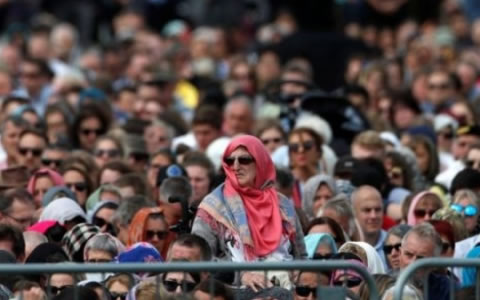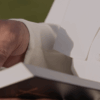A ‘call to reflect’ with Muslims puts faith in the public square
Carolyn Moynihan is deputy editor of MercatorNet
Nothing calls for prayer as much as sudden disaster and death. So it happened today, exactly a week to the hour after the terror shootings of Muslims at prayer in Christchurch last Friday, that New Zealanders were called to prayer to reflect on this horrific event and on all that has happened since.
God willing, it is a unique occasion; we never want another national observance for the same reason. And yet, to the extent that we have acted in solidarity with a religious community, the nation has publicly acknowledged God, faith and prayer. There are not many things which do that for us.
At Hagley Park, a vast space next to the Al Noor Mosque where the gunman claimed most of his victims, thousands gathered with Prime Minister Jacinda Ardern, government officials and other dignitaries, surrounding the Muslim community gathered for their Friday devotions. Ms Ardern and a number of women, including TVNZ reporters, wore headscarves.
In a brief opening speech the Prime Minister said:
“According to Muslim faith, the prophet Mohammed, sallallahu ‘alayhi wa sallam [peace be upon him], said the believers, in their mutual kindness, compassion and sympathy are just like one body. When any part of the body suffers, the whole body feels pain. New Zealand mourns with you. We are one.”
At 1.30 the call to prayer rang out. There followed two minutes of silence, which the whole country had been invited to observe. Silence reigned, and continued in the crowd as Imam Gamal Fouda of the Al Noor Mosque alternately led his community in prayer, and addressed New Zealanders with messages of thanks, defiance in the face of xenophobia and terrorism, warning and hope.
He claimed the 50 dead as martyrs not only of Islam but “of this nation New Zealand,” who would even now be enjoying a high place in Paradise – something of great importance to Muslims. The victims’ blood, he said, had “watered seeds of hope” and new life for New Zealand and for humanity.
Thousands are likely to have watched these solemnities on television, and thousands more will be attending vigils this evening at mosques and parks throughout the country – gatherings which have been occurring all week to honour the dead and console the 48 injured, their families and community.
To these events Kiwis have brought the tribute of their own faiths and cultural diversity. Maori, as is normal on many public occasions, welcomed and led the official party to their allotted space for the Hagley Park ceremony. Maori gangs have been keen to offer protection at mosques. The haka, the warlike Maori welcome, is to be seen everywhere – notably among schoolboys.
An inner-city Auckland Catholic church opposite a mosque hosted the Friday prayer on the day of the attack, when the mosque was closed, and this morning a group of Catholics sang a Maori waiata (hymn) in honour of the Blessed Virgin as a tribute to their Muslim neighbours, who recognise Mary as the mother of Jesus. And this is only one example of the interfaith climate already existing in the country but intensified by the Christchurch attacks.
(Inevitably there was the odd protest. The leader of a Christian group that seems to appeal to marginalised people, especially men, thought things had gone too far with the Muslim prayer setting in Hagley Park. He seemed a bit confused about God as well.)
However, New Zealand is a very secular country; migrants are far more religious. The opening prayer for Parliament still addresses “God”, but recently was purged of “Jesus Christ” (and the Queen). The national anthem, God Defend New Zealand, is often sung only, or first (as today at Parliament grounds) in Maori, although it was composed in English. This may help those who have trouble addressing God, but is not much help to those who can barely get through one verse in Maori. The English, however, speaks of “Men of every creed and race” who “gather here before thy face…” — so appropriate today, except for the women who don’t like singing about “men”; but that is another story.
Maori, as the indigenous people, are the ones who usually carry the baton for public religious expression in this country. For practically any occasion of national importance, at least, they perform opening prayers (karakia) hymns or songs (waiata) and blessings (manaakitia). Anzac Day services for those fallen in war are the only events of national significance where Christian ministers officiate and lead prayers and hymns.
Jacinda Ardern was raised as a Mormon but gave it away. After taking up the premier’s role she identified herself as an agnostic. Yet she seemed perfectly at ease wearing a hijab and quoting the Prophet. In her initial response to Christchurch attacks she told the Muslims her “thoughts” were with them. Later she adopted the more adequate and familiar “thoughts and prayers”; having learned to pray as a child it could not have been all that difficult for her. And that would go for the majority of Kiwis.
The events of one week, even with all its fatalities and reminders of our helplessness in the face of death, will probably not make us more religious. It probably will not stop secularist fundamentalists wanting to drive voluntary religious instruction out of schools, or holding Christian (or Muslim, for that matter) opinions about moral issues of no account – if not “hate speech”.
But the response to the attack on the Muslim community has shown that we do respect people who happen to believe in God, practise their faith and pray. We have made room for them in the public square, even with the full sanction of the state. We should hang onto that example in the difficult debates that are waiting to be taken up again when all the dead of Christchurch attack are buried, and all the wounded restored to their families.
This article by Carolyn Moynihan was originally published on MercatorNet under a Creative Commons licence. The original article can be found here.










0 Comments